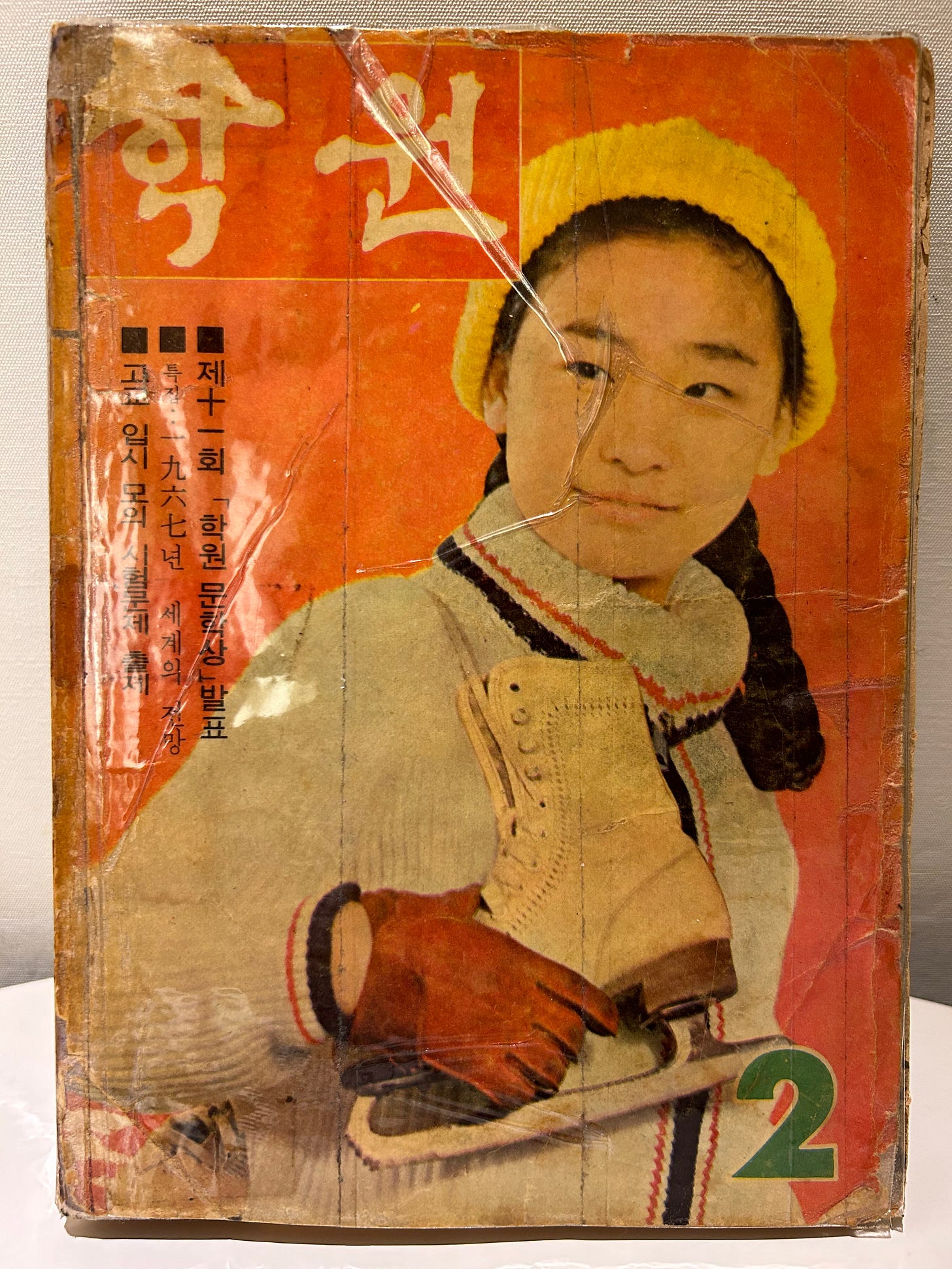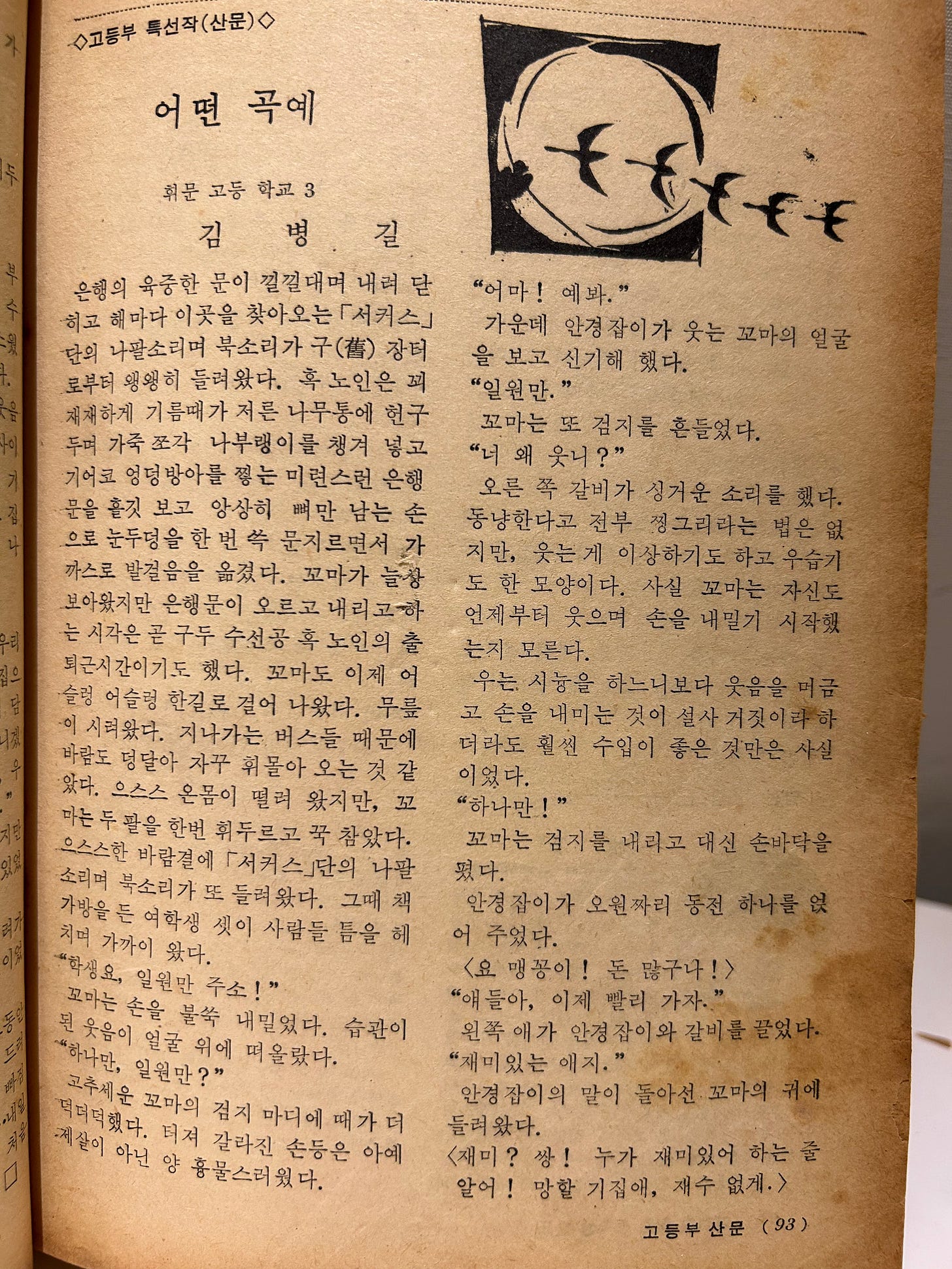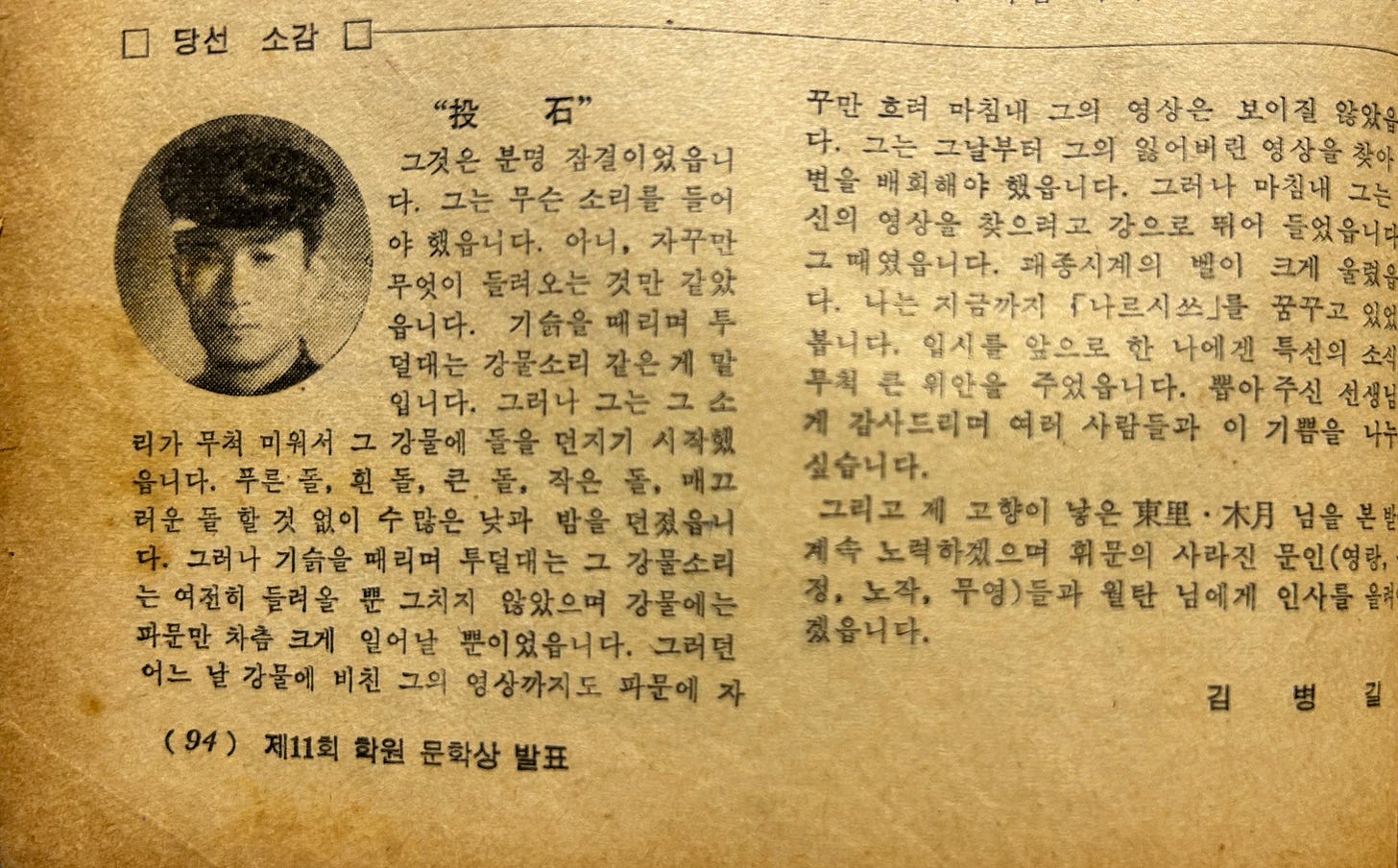Me, My Dad, and Our Placeholders
How I stay connected with my dad through the Placeholder in life and death
In the fall of 2024 I spent a lot of time in Korea with my dad while working on my first book, The Placeholder. He was dying from terminal cancer and I knew his time with us was limited. One day, he asked me to look for an old magazine from one of the bookshelves in his apartment. He had a photographic memory of where it was in the middle of thousands of books he owned: “I want you to keep it safe because it’s very important for me,” he told me in a trembling voice.
The magazine was from 1966. The entire cover had turned yellow, and all the colors were faded. The binding was falling apart with loose pages throughout. It was a famous literary magazine for high school students in the 1960s in Korea. My dad, who was in high school then, wrote a short story and it was selected and published in that magazine.
I flipped through the brittle pages very carefully to look for his story. There he was in a small black and white photo of his nineteen-year-old self. He looked a bit anxious and serious in a school uniform. What he wrote was a coming-of-an-age story about an orphaned boy from the Korean war. The critics of the magazine said in their review of my dad’s work that they appreciated his sincere effort to understand the poignancy of life. Since then, he dreamed of becoming a novelist.
His love for books and writing continued through his college and he worked as an editor in chief for the university paper, too. Eventually, he became a journalist and worked for several newspaper companies as an editor-in-chief and columnist. He wrote columns almost every day over thirty years about various topics from political to social and cultural issues in Korea. With those columns and essays, he also published five books. His life was full of books and writing he had loved since he was young.
A couple of years ago, when he finally retired from his post as a columnist, I asked him what he wanted to do for the rest of his life, now finally free from his daily writing duty. Without hesitation, he answered, “I want to write a good novel before I die. That’s always what I wanted to do but I was too busy to pull that off.” I asked him if he had a story in mind. He smiled and said, “Oh, I have many stories to write about…”
On November 1st, 2024, about a month after he asked me to take care of the magazine with his first fiction published, he died. He was seventy-seven. After his funeral, I opened up that magazine again and read what he said in the interview about his short story being selected by the magazine. He said, “For a long time, I doubted myself as a novelist. I wasn’t sure if I deserved to be it. I am so grateful for this recognition because it encourages me to keep writing stories no matter what. That will prove me as a novelist.”
Reading it, I felt so bad about what might have stopped him from writing the novel he always wanted to write. As an editor-in-chief, columnist, eldest son, brother, husband, and father, he had so many responsibilities. He liked his career though. He dedicated his entire life to it, and had achieved a lot. But I couldn’t help but wonder, Would he have regretted not writing a novel?
One day after the funeral, I discovered his journal among his possessions. This was surprising, because he didn’t write much personally since he had to write everyday for work. I never got any letters or Christmas cards let alone emails from him. The journal started with an entry about his reflection as he was about to retire, just a couple of years ago. He wrote how strange it was to not write every day and also made a long list of things he wanted to do in his free time.
Then I discovered many little notes he scribbled on the journal. They were notes about some news he watched on TV or what he read in books. Other notes were about his thoughts around some political events or social issues. I realized they were recollections for whatever he was going to write about in the future. This was familiar to me, as I grew up seeing those random notes here and there scribbled in his handwriting around the house.
What was this for? He didn’t have to write his columns anymore, I wondered. Only then, it hit me; it was for the very first novel he always wanted to write.
He still remembered what started his writing career fifty nine years ago. At age seventy-seven, he was willing to give it a shot and try reinventing himself as a novelist he always wanted to be. He was entering his own Placeholder again. Holding the journal, I broke down crying.
Observing my dad’s dying process, I almost gave up finishing the work on my book, The Placeholder. The grief with my dad’s dying and death showed me another dimension of life I never knew, which despaired and depressed me.
However, it was as if my dad was telling me to keep writing, finishing the work through his journal full of new ideas and inspirations he took notes of: ‘Look—I never stopped dreaming and experimenting even at age 77! You can do it. Of course you can!’
Writing this book was a huge undertaking for me. Beyond the time and effort it took, it was a new kind of experiment in my Placeholder. Only working on this book, I understood how hard my dad worked as a writer for his entire life, writing for the newspaper everyday and publishing five books. And he never stopped experimenting, as his journal showed. He was the very first writer I knew in my life and inspired me to finish writing this book even after his death.
The Placeholder: The Place to Go to Create Your Noble Work will be available in late April on Amazon and some bookstores in the US. It is not an understatement that I finished this book for my dad. I cannot tell you how much I wish he were still here to celebrate this with me. Regardless, I think he’ll be happy to see this out in the world, wherever he is now.






I remember reading somewhere that when you write, no matter who you intend the writing for, inevitably some of that becomes writing for yourself too. Thank you for sharing such a beautiful story and can't help but wonder if by having completing this book you fully blossomed the seed that your father had planted to write. I can't wait to read your book!
Even though my relationship with my mother was challenging, one of the things I admired most about her was her enthusiasm for learning new things. She took an investment class in her 50's and grew her portfolio in ways no one would have expected from a concert pianist who gave up her career to raise a family. She created her own line of skin care in her 60's. She died in June 2020 - she modeled for me that it's never too late to pursue your dreams. For that, I am eternally grateful. Thank you for sharing this beautiful story, Miroo.